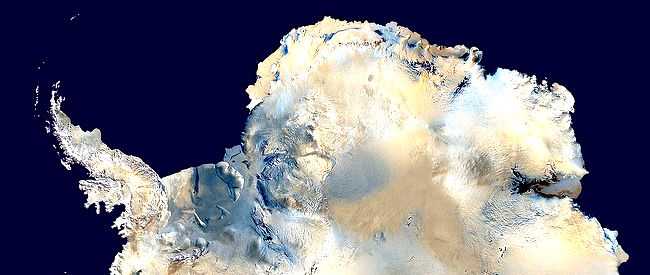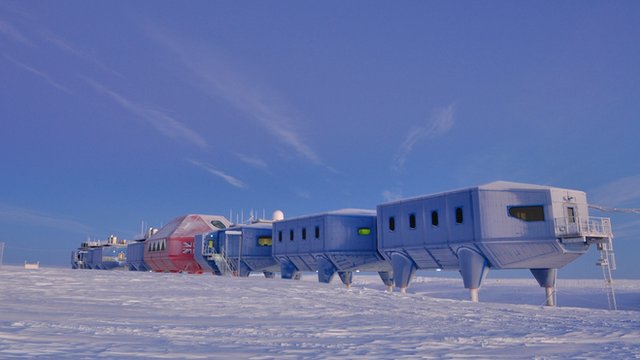Every year, the BBC broadcasts a special program to the scientists and support staff in the British Antarctic Survey Team. The BBC plays music requests and sends special messages to the small team of 40+ located at various Antarctic research stations. Each year, the thirty minute show is guaranteed to be quirky, nostalgic, and certainly a DX-worthy catch!
After successful listener events from years past, I’m once again calling on all SWLing Post readers and shortwave radio listeners to make a short recording (say, 30-60 seconds) of the BBC Antarctic Midwinter Broadcast today and share it here at the Post (frequencies and time below).
The recording can be audio-only, or even a video taken from any recording device or smart phone. It would be helpful to have a description and/or photo of your listening environment and location, if possible. Please only submit recordings made from your location–since this is all about how you’re able to receive the broadcast at your location, we would rather not include WebSDR recordings.
Audio should be in the MP3 format and videos either hosted on YouTube or Vimeo so that I can easily embed them without having to convert and upload myself.
If you submit your recording to me, I will post it here on the SWLing Post–and insure that the British Antarctic Survey receives the post, too. The recordings will be arranged by geographic location. Note that due to my schedule this year, it might take a few weeks before I can curate all of the recordings (the process typically takes 8+ hours!).
Frequencies
UPDATE (June 21, 2019): Broadcast frequencies have been confirmed by the BBC as 5875, 7360, and 9455 kHz.
Please note that the broadcast begins at 2130 UTC on (Friday) June 21, 2019.
The following frequencies were provided by The Bulgarian DX Blog and were used in the BBC test broadcast. Typically, the same frequencies are used during the live broadcast—we will update this post with any last-minute changes.:
2130-2145 on 5875 WOF 300 kW / 184 deg to Antarctica English-very good
2130-2145 on 5990 DHA 250 kW / 203 deg to Antarctica English-fair/good
2130-2145 on 7360 ASC 250 kW / 207 deg to Antarctica English-very good
2130-2145 on 9455 WOF 300 kW / 182 deg to Antarctica English-very good
The Midwinter broadcast is one of my favorite programs of the year. I suppose, in part, this is because it happens on June 21–the Summer/Winter solstice–which also happens to be my birthday! Woo hoo!



please confirm frequencies and times for 2020 BBC broadcast for Antartica so we can tune in
I’ll be publishing these frequencies and times on the blog this weekend, but thanks to Richard Langley we know the three chosen frequencies:
5790 kHz from Woofferton UK
7360 kHz from Woofferton UK
9580 kHz from Ascension Island
The time is 21:30 UTC on June 21, 2020.
Greeting from Japan!
Here is my audio clip when I received in my home at Niigata Japan (PM97cc)
21-June-2019 2130UTC
7360kHz
KiwiSDR (my own) with an RF-Pro-1B small active loop antenna.
The local time here in Japan was 6:30 in the Saturday morning.
https://www.mediafire.com/file/lw0xsf4rip3fb8o/BBC_Midwinter_2019_2019-06-21_2130Z_7360kHz.mp3/file
Listenig on 9455 kHz Am mode, UTC 2132, sinpo 55454 . North West Italy locator jn34xx . RX: yaesu grg 100 ant: horizontal dipoleb v invertd balun9:1 long 77 Mts.
73s de Roberto IU1MMU , Asti province locatore jn34xx
Hi, my first post. Here’s my recording on my old valve trio with an indoor wire aerial
Happy Birthday, Thomas!
https://youtu.be/3rGxxBMWiVw is “49 seconds of the 2019 BBC Antarctic Midwinter Broadcast as received at WA1LOU in Wolcott, CT, USA using an ICOM IC-R8600 receiver and Hy-Gain 18 AVT/WB-A vertical antenna. I programmed the four frequencies that were originally announced for the broadcast into the IC-R8600, but learned afterwords that only three were used (5875, 7360, 9455). I had solid copy on 9455 throughout the broadcast. 7360 had a lot of fading, but was still fair copy throughout the broadcast. 5875 was very poor copy during the last 10 minutes; there was no copy for the first 20 minutes.”
Stan, WA1LOU
(I erroneously posted this reply to your FTIOM & UBMP post! So please delete that reply and meanwhile, I’ll get the hang of the Internet one of these days! LOL)
All three frequencies listened in Italy. Good signal but a little QSB expecially for KHz 7360.
My video: https://youtu.be/uVs1y9la1oA
SWL Report:
Listener: Massimiliano Fiorillo IU4HMZ
Location: Italy (Ferrara)
kHz 5875 SINPO 55545
kHz 7360 SINPO 44434
kHz 9455 SINPO 55555
Receiver: ICOM IC7410 – ICOM IC R71E
Antenna: Yagi 5 Band 10 elements – Wellbrook Ala 1530
Tnx and 73’s de IU4HMZ, Massimiliano
Hi Thomas,
I listened to BBC Midwinter broadcast on all three frequencies. Reception was superb with exception of 5875 kHz. There was some digital mode traffic noise.
Location: Corstorphine Hill near Edinburgh Zoo
Receiver: Tecsun PL-880 portable plus long wire antenna.
Time: 2130 UTC
73 Ron
All 3 frequencies received in Broadstairs, Kent, UK. I recorded the entire stream and eventually settled on 5875Khz for best reception with minimum QSB. I used an SDRPlay RSP1A with a 130′ End Fed Half Wave antennas set up as an Inverted L. The notch filters in SDRUno were used to remove the unwanted data signal from the passband with good results.
Overall, a very enjoyable experience thinking of the crew of the BAS research stations and their long over winter experience.
Broadcast received on all three frequencies at Maidenhead Grid Location: IO75sj with multiple receivers and antennas. Best reception was on 7360kHz Q5 audio S9+10dB with light QSB for last 5 minutes of broadcast but still fully readable. Using 40 Year old Yaesu FT-707 HF transceiver and 80m dipole antenna 28ft above good ground, strung East-West : Also received on 9455kHz Q5 audio S9 with slow rolling QSB down to S6 during whole broadcast. Using 40 year old Yaesu FRG-7 receiver and ‘G7FEK’ compact multiband wire antenna 24ft above good ground, strung East-West. : 5875 kHz reception was Q4 audio S8 with slow QSB down to S5 Using Icom IC-756 HF transceiver and 38ft vertical. Yours appreciatively Paul Scott, MM7WAB, Ayrshire, S.W.Scotland.
I will try a full recording as in the past and post it on my YT Channel again. But this year I’m on the last day on my vacation. Hope everything works well.
BTW: Happy Birthday Thomas !
73s Ralf
Nice! I’ll try here in Brazil. It would be wonderful if they could issue QSL´s on those special winter occasions at least.
The three frequencies to be used according to the HFCC registration for 21 June are 5875, 7360, and 9455 kHz.
BBCWS Audience relations emailed me this morning confirming three frequencies will be 5875, 7360 and 9455. 73, Alan
I listened to this last year for the first time and really enjoyed it.
Looking forward to this year’s broadcast.
The following is a beautiful photo of the scientists listening to
the broadcast:
http://beautifulocean.org/content/listening-to-bbc-midwinter-broadcast/
This site has 366 beautiful photos by Michal Krzysztofowicz Photography of Antarctica.
You should definitely spend some time scrolling through them.
73
Bill
WD9EQD
Thanks to everyone who notice the incorrect day on the broadcast schedule (Friday June 21, 2019 is correct). 🙂
Thomas
Buenas tardes me interesa la información de emisoras de países lejanos y sobre todo de estaciones antàrticas,serìa un placer tener actualizadas las frecuencias y horarios para hacer escucha. Soy radio aficionado pero me apasiona hacer escucha en otras bandas, desde ya muchas gracias. Saludos cordiales Guillermo Nicolás desde Castelar Bs As.
give me the e mail address of swling post so i can send the mp3 audio, and the e mail address of bbc please.
For me, simply email the audio file to thomas at swling.com!